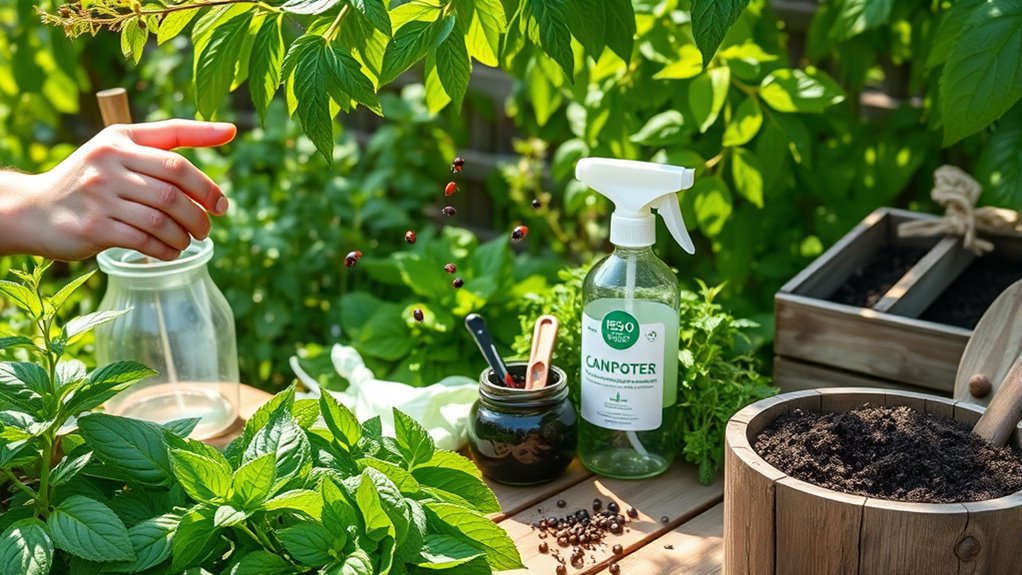To control pests organically, attract beneficial insects like ladybugs and lacewings by planting nectar-rich flowers, and avoid chemical sprays that harm them. Use homemade repellents with garlic or neem oil and apply them regularly. Plant companion species like basil near tomatoes or marigolds to repel pests naturally. Promoting a healthy ecosystem by combining these methods keeps pests in check while supporting plant health. Keep exploring for more effective strategies to maintain a thriving, chemical-free garden.
Key Takeaways
- Attract beneficial insects like ladybugs and lacewings using nectar-rich flowers to naturally control pests.
- Use homemade natural repellents such as garlic spray, neem oil, or hot peppers regularly.
- Implement companion planting with pest-repelling plants like marigolds and basil to deter pests.
- Maintain a healthy, balanced garden ecosystem by avoiding chemical pesticides and supporting beneficial bugs.
- Reapply organic repellents after rain and monitor garden health to ensure effective pest management.

Are you looking for safe and effective ways to protect your garden without relying on chemical pesticides? One of the best methods is encouraging beneficial insects to take up residence in your garden. These natural allies, like ladybugs, lacewings, and predatory beetles, feed on common pests such as aphids, spider mites, and whiteflies. By creating a welcoming environment, you can attract these helpful insects and let them do the work for you. Planting a variety of nectar-rich flowers like dill, fennel, and marigolds provides food sources for beneficial insects, keeping them around longer and increasing their pest control impact. Avoid using broad-spectrum insecticides, which can harm these helpful bugs and disrupt your natural pest management system. Incorporating self-discovery techniques such as journaling can help you monitor which plants and strategies are most effective in your garden. In addition to attracting beneficial insects, using natural repellents can markedly reduce pest problems. Many household ingredients act as effective repellents against common garden pests. For example, a spray made from garlic, hot peppers, or neem oil can deter insects from settling on your plants. These natural repellents are safe for your plants, pets, and the environment, making them a smart alternative to harsh chemicals. Applying a homemade garlic spray or neem oil solution regularly creates a protective barrier, discouraging pests from feeding or laying eggs. Consistency is key — reapply after rain or watering to maintain their effectiveness. These repellents not only keep pests at bay but also promote a healthier, more balanced garden ecosystem. Implementing companion planting is another organic pest control strategy that works well alongside beneficial insects and natural repellents. Certain plants naturally repel pests or attract beneficial insects, creating a symbiotic relationship that protects your garden. For instance, planting basil near tomatoes can deter whiteflies, while marigolds repel nematodes and aphids. By carefully choosing which plants to grow together, you create a natural pest barrier that reduces the need for intervention. This method encourages a diverse and resilient garden environment, making it less inviting for pests and more attractive to beneficial insects. Together, these organic pest control methods—encouraging beneficial insects, applying natural repellents, and practicing companion planting—form a powerful, eco-friendly approach to managing pests. They work in harmony, supporting the health of your plants and the surrounding environment. You’ll find that with patience and consistency, your garden can thrive without the risk of chemical harm, all while maintaining effective pest control. This holistic approach not only protects your plants but also nurtures a sustainable garden that’s safer for everyone involved.
Frequently Asked Questions
Are Organic Pest Control Methods Effective Against All Pests?
You might wonder if organic pest control methods are effective against all pests. While organic efficacy varies, many methods work well, but pest resistance can develop over time, reducing effectiveness. Some pests may require different approaches or integrated solutions. Organic methods are often safer and more sustainable, but they might not be a one-size-fits-all. Understanding pest behavior helps you choose the right organic strategies for effective control.
How Long Does It Take to See Results From Organic Methods?
Ever wonder if organic pest control delivers quick results? Timing expectations vary, much like a waiting game, depending on pest type and infestation severity. You might see initial signs within a few days, but full results can take a couple of weeks. Result variability exists because organic methods work with nature’s timing, not against it. Patience and consistent application are key to seeing organic pest control’s true effectiveness.
Can Organic Pest Control Harm Beneficial Insects?
You might wonder if organic pest control harms beneficial insects, and the answer is generally no. Organic methods target pests with minimal chemical impacts, reducing harm to beneficial insects like pollinators and natural predators. When you choose organic options, you avoid broad-spectrum chemicals that can disrupt your garden’s ecosystem. This careful approach helps protect beneficial insects while effectively managing pests, making organic pest control a safer choice for your garden’s health.
Are Organic Pest Control Methods Safe for Children and Pets?
You’re wondering if organic pest control methods are safe for children and pets. Generally, they’re designed to be less toxic than chemical options, prioritizing child safety and pet protection. However, it’s essential to follow application instructions carefully, keep children and pets away during treatment, and store products safely. When used properly, organic methods help control pests without risking your loved ones’ health or safety.
How Often Should Organic Treatments Be Reapplied for Best Results?
They say “an ounce of prevention is worth a pound of cure,” so your application frequency is key. For best results, follow the reapplication schedule recommended on the product label, usually every 7 to 14 days. Keep an eye on pest activity, and reapply organic treatments as needed. Consistent reapplication helps maintain a pest-free environment without overdoing it, ensuring your yard stays safe and healthy.
Conclusion
By embracing these organic pest control methods, you’re planting seeds of harmony in your garden. Think of your efforts as nurturing a delicate ecosystem where beneficial insects thrive, and pests fade away like shadows at dawn. With patience and care, your garden becomes a vibrant sanctuary—alive with healthy growth and resilience. Remember, each natural choice is a brushstroke in the masterpiece of a balanced, pest-free paradise. Your dedication transforms your space into a flourishing haven for all.









